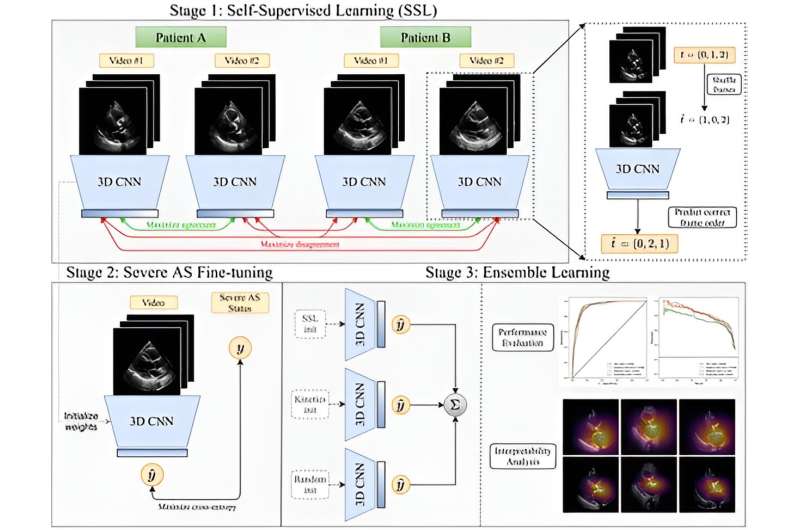This article has been reviewed according to Science X's editorial process and policies. Editors have highlighted the following attributes while ensuring the content's credibility:
fact-checked
peer-reviewed publication
trusted source
proofread
Artificial intelligence automates diagnosis of severe heart valve disease

Researchers at the Cardiovascular Data Science (CarDS) Lab have developed a novel approach that can detect a common valvular heart disease known as severe aortic stenosis from ultrasound scans of the heart. The study, published August 23 in the European Heart Journal, could have implications for routine clinical care.
Severe aortic stenosis, or AS, is a major health disorder, particularly among older adults, caused by a narrowing of the aortic valve. Early diagnosis can enable interventions to alleviate symptoms and reduce the risk of hospitalization and premature death.
Specialized ultrasound imaging of the heart, called doppler echocardiography, is the main test to detect AS. The team developed a deep learning model that can use simpler heart ultrasound scans to automatically detect severe AS.
The technology was developed by Rohan Khera, MD, MS, an assistant professor of cardiovascular medicine and health informatics, director of the CarDS Lab, and the study's senior author, and colleagues at the Chandra Family Department of Electrical and Computer Engineering at UT Austin, with 5,257 studies that included 17,570 videos between 2016 and 2020 at Yale New Haven Hospital. The model was externally validated by 2,040 consecutive studies from different cohorts in New England and California.
"Our challenge is that precise evaluation of AS is crucial for patient management and risk reduction. While specialized testing remains the gold standard, reliance on those who make it to our echocardiographic laboratories likely misses people early in their disease state," said Khera.
"Our goal was to develop a machine learning approach that would be suitable for point-of-care ultrasound screening," said the study's co-first author Evangelos Oikonomou, MD, DPhil, a cardiology fellow and a current postdoctoral researcher in the CarDS Lab.
Their work allows the early detection of aortic stenosis so patients can receive timely care. "Our work can allow broader community screening for AS as handheld ultrasounds can increasingly be used without the need for more specialized equipment. They are already being used frequently in emergency departments, and many other care settings," added Khera.
The advance is a result of close collaboration between clinician-investigators and computer scientists. Greg Holste, a Ph.D. student at UT Austin, being co-advised by Dr. Khera, who led the development of an innovative methodology that enabled the technology and was a co-first author of the study. "To allow practical development that leverages emerging technology for improving clinical care, such multidisciplinary collaboration is essential," emphasized Dr. Khera.
More information: Gregory Holste et al, Severe aortic stenosis detection by deep learning applied to echocardiography, European Heart Journal (2023). DOI: 10.1093/eurheartj/ehad456





















